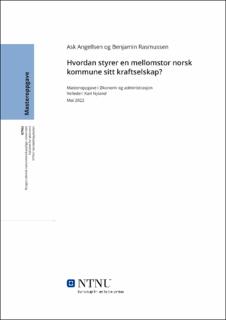| dc.contributor.advisor | Nyland, Kari | |
| dc.contributor.author | Angellsen, Ask | |
| dc.contributor.author | Rasmussen, Benjamin | |
| dc.date.accessioned | 2023-10-10T17:20:56Z | |
| dc.date.available | 2023-10-10T17:20:56Z | |
| dc.date.issued | 2023 | |
| dc.identifier | no.ntnu:inspera:146717544:151075995 | |
| dc.identifier.uri | https://hdl.handle.net/11250/3095619 | |
| dc.description.abstract | Den norske kraftbransjen er i dag i stor grad kommunalt eller fylkeskommunalt eid, der kommunene budsjetterer med en utbytteinntekt i sine inntekter. Det er derfor svært interessant å se på hvordan kommunene styrer sine kraftselskap, ettersom inntekten fra selskapene er en viktig faktor for kommunens drift. I vår case har vi sett på hvordan en mellomstor norsk kommune styrer sitt kraftselskap. Dette er en unik case fordi kommunen eier selskapet 100%, vanligvis er det gjerne flere kommuner som har felles eierskap i et kraftselskap. Ut fra nevnte kontekst har vi utformet problemstillingen: «Hvordan styrer en mellomstor norsk kommune sitt kraftselskap?» Ved hjelp av tre forskningsspørsmål har vi forsket på hvilke styringsmekanismer som brukes, hvilke styringsutfordringer en opplever og hvordan man skal ivareta de framtidige verdiene.
Det teoretiske rammeverket som er tatt i bruk for å svare på problemstillingen inkluderer agentteori, formelle og uformelle styringsmekanismer, Malmi og Brown økonomistyringspakke, interorganisatoriske relasjoner og tillit, eierstyring og samfunnsansvar. Oppgaven er en kvalitativ studie der datainnsamlingen har skjedd gjennom semistrukturerte intervjuer, med 3 informanter fra kommunen og 3 informanter fra kraftselskapet.
Gjennom oppgaven har vi kommet fram til at kommunens styring skjer både gjennom formelle og uformelle mekanismer. Analysen diskuterer at det brukes formelle mekanismer som generalforsamling og eiermelding, samt at det er en stor grad av den uformelle mekanismen tillit i styringen. Når det gjelder utfordringer diskuterer analysen agentproblemer, at kompetansen i kommunen er lav, i tillegg til at det er en skjev balanse mellom kontroll og tillit noe som øker informasjonsasymmetrien. For å ivareta både finansielle og ikke-finansielle verdier i framtiden kommer det fram av oppgaven at kommunen er opptatt av bærekraft, og at kraftselskapet skal bidra til utvikling i lokalsamfunnet. På grunn av dette legger kommunen opp til at kraftselskapet skal få handlingsrom til å sikre verdier, og ta sin del av samfunnsansvaret som kommunen verdsetter høyt. Ut fra funnene konkluderer vi med at det er en veldig tillitsbasert styring i kommunen, som støttes av noen enkle lovpålagte formelle mekanismer. Vi ser at tilliten er så sterk at kommunen ikke bruker de formelle mekanismene ofte. | |
| dc.description.abstract | The Norwegian electricity sector is predominantly owned by municipalities or county governments, with municipalities including dividend income in their budgets. Therefore, it is fascinating to explore how municipalities manage their electricity companies, as the company's income plays a vital role in the municipality's operations. Our case study focuses on a medium-sized Norwegian municipality and examines how it governs its electricity company. This case is unique as the municipality has full ownership of the company, whereas multiple municipalities typically have shared ownership in such companies. To address this context, we have formulated the following research question: 'How does a medium-sized Norwegian municipality manage its electricity company?' Through three sub-questions, we investigate the governance mechanisms employed, the challenges faced, and strategies for safeguarding future values.
The theoretical framework encompasses agency theory, formal and informal governance mechanisms, Malmi and Brown's management control package, interorganizational relationships and trust, ownership control, and corporate social responsibility. Our study adopts a qualitative approach, utilizing semi-structured interviews with three representatives from the municipality and three representatives from the electricity company.
Our findings indicate that the municipality's governance involves a combination of formal and informal mechanisms. The analysis highlights the use of formal mechanisms such as general meetings and owner instructions, alongside a significant reliance on informal mechanisms such as trust. The challenges identified include agency problems, limited municipal expertise, and an imbalance between control and trust leading to information asymmetry. To ensure the preservation of both financial and non-financial values in the future, the municipality places a strong emphasis on sustainability and expects the electricity company to contribute to local community development. Consequently, the municipality provides the company with flexibility to protect its assets and fulfill its social responsibilities, which are highly valued by the municipality. In conclusion, our study reveals a governance approach in the municipality that is built on a foundation of trust, with only a few simple formal mechanisms. | |
| dc.language | nob | |
| dc.publisher | NTNU | |
| dc.title | Hvordan styrer en mellomstor norsk kommune sitt kraftselskap? | |
| dc.type | Master thesis | |
